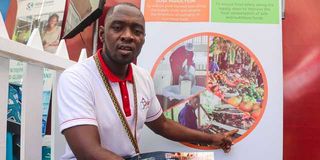Sankalp Africa Summit: Agribusiness innovations and ventures making good money

Kamsa Poultry CEO Steve Sande during the Sankalp Africa Summit 2024 at the Kenya School of Monetary Studies, Nairobi.
What you need to know:
- The annual Sankalp Africa Summit is a gathering of key players in the continent and India’s innovation ecosystems.
- The aim of the Summit is to accelerate transformative solutions for a thriving and self-sufficient Africa.
- The summit was designed to drive Africa towards sustainable development by highlighting entrepreneurship as a catalyst for change.
The annual Sankalp Africa Summit is a gathering of key players in the continent and India’s innovation ecosystems. The summit has a special interest in agriculture.
Held at the Kenya School of Monetary Studies, this year’s conference focused on six impact areas – agriculture and food security; gender, livelihoods and youth employment; health, nutrition and sanitation; natural resource management; circular and regenerative economy; and climate and clean energy.
The aim was to accelerate transformative solutions for a thriving and self-sufficient Africa.
Convened on February 28 and 29, the summit was designed to drive Africa towards sustainable development by highlighting entrepreneurship as a catalyst for change. It attracted about 1, 000 participants.
Seeds of Gold sampled some of the farmers and players in the agriculture value chain.
Vegetable value-addition
Nzivoo Katoo, the founder of Green Leaf Veggies, showcased the potential of dried indigenous vegetables like cowpeas (kunde), black nightshade (managu) and amaranthus (terere), as key nutrition and sustainable agriculture components.
Driven by a passion for preserving family vegetables and inspired by the abundance of kunde during rainy seasons contrasted with scarcity in the dry months, Nzivoo began exploring traditional methods of preservation 20 years ago.
Starting with kunde, he sought to address fresh produce post-harvest losses.
“My contribution to vegetable processing has only covered about one per cent of post-harvest losses,” he says.
Green Leaf Veggies has established a network of 20,000 supplier farmers. With a focus on standards, Green Leaf Veggies accepts leaves not older than three days after harvesting.
Nzivoo processes 2.5 tonnes every two days, with prices ranging from Sh100 for a 50-gram pack to Sh200 (80 grams).
The firm also export its products to Ghana, Spain, Bahrain, the UAE, Canada, the United States and other countries.
Dairy venture
Gabriel Mahindu Kwendo’s journey epitomises the transformative power of determination. He is the co-founder of Comrades Dairy and Food Enterprises.
It began in 2018 when Gabriel and two fellow Egerton University students started aggregating milk from farmers in Njoro. They processed the milk to high quality products.
“We were not just interested in profit. Our main aim was to empower farmers financially and enrich consumer experiences,” Kwendo says.
“Comrades Dairy offers a diverse range of products, from pasteurised milk to flavours like vanilla, strawberry and herbal probiotic yoghurt.”
Drought tolerant crop miller
Gemini Flour Mills in the Coast is owned by Edwin Mairo and Evelyne Alpha. The processor adds value to traditional drought-tolerant cereals.
The company is committed to improving the financial status of sorghum, millet, soybean and amaranthus farmers.
“We started as a small miller in 2017,” Mairo says, adding that the marketing model involved door-to-door sales in slums.
Having registered the company in 2019, Gemini Flour Mills has reached out to1,600 smallholders in Kwale and Kilifi. Through Kenya Seeds company, Gemini trains farmers on good practices.
Kienyeji poultry
Steve Sande, the CEO of Kisumu-based Kamsa Poultry Ltd, was a key part of the fair. Established in 2014, Kamsa Poultry embarked on a mission to revolutionise nutrition and combat hunger in Kenya through producing yellow-yolked chicken eggs.
Kamsa Poultry started with fewer than 50 birds, some generously provided by neighbours.
The venture did not demand extensive land or capital. Initially operating as a kienyeji chicken farm, Kamsa Poultry faced marketing challenges.
“In 2018, we pivoted the business to focus on layers, expanding the flock to 2,000,” Sande says.
Recognising the need for support, Sande applied for aid from Global Alliance for Improved Nutrition (GAIN) in 2019.
He received training from GAIN, honed his business skills and conducted comprehensive market research.
By 2020, Kamsa Poultry had scaled up operations, boasting of 5,000 layers. Sande adopted the cage system. The transition to battery cages streamlined operations and maximised output.
GAIN, the Scaling-up Nutrition Business Network (SBN) and the World Food Programme seek offer assistance in business modelling and encourage responsible actions, according to SBN Africa Regional Manager Margaret Ngetha.





